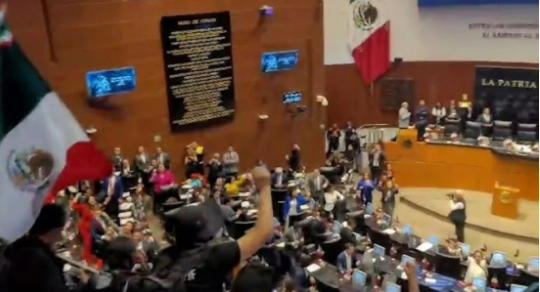On Tuesday, protesters stormed Mexico’s Senate, causing lawmakers to suspend a debate on a contentious proposal by outgoing President Andres Manuel Lopez Obrador to allow voters to elect judges. The proposed judicial reform, which would make Mexico the world’s only country to elect all judges, has led to widespread demonstrations, diplomatic tensions, and concerns among investors.
Senate President Gerardo Fernandez Norona called a recess after demonstrators breached the Senate building and entered the chamber, chanting “The judiciary will not fall.” Lawmakers were then forced to relocate to a former Senate building to continue their debate, while protesters outside yelled, “Mr. Senator, stop the dictator!”
Lopez Obrador, who wants the bill passed before he hands over the presidency to close ally Claudia Sheinbaum on October 1, argues that the current judicial system serves the interests of the political and economic elite. He has described the judiciary as “rotten,” corrupt, and plagued with nepotism. “What most worries those who are against this reform is that they will lose their privileges, because the judiciary is at the service of the powerful, at the service of white-collar crime,” he said at a news conference.
Opponents of the reform, including court employees and law students, have been protesting against the proposal, which would require that even Supreme Court and high-level judges, as well as local judges, be elected by popular vote. About 1,600 judges would need to stand for election in 2025 or 2027.
Margaret Satterthwaite, the United Nations special rapporteur on the independence of judges and lawyers, commented, “This does not exist in any other country.” She noted, “In some countries, such as the US, some state judges are elected, and in others, such as in Bolivia, high-level judges are elected. If this reform passes, it will place Mexico in a unique position in terms of its method for judicial selection.”
In an unusual public warning, Supreme Court Chief Justice Norma Pina expressed concerns that elected judges could be more susceptible to pressure from criminals, given the influence of powerful drug cartels in Mexico. “The demolition of the judiciary is not the way forward,” Pina said in a video released on Sunday.
Last week, Pina noted that the top court would consider whether it has the jurisdiction to halt the reforms. However, Lopez Obrador has argued that there is no legal basis for such an action. The reforms, which were passed last week in the lower house by ruling party lawmakers and their allies, were conducted in a sports center due to protesters blocking access to Congress.
In the upper house, the ruling coalition is one seat short of the 86 votes needed for a two-thirds majority to amend the constitution. There is speculation that the coalition might have secured an extra vote from an opposition senator, who has been labeled a “traitor” by his party.
The United States, Mexico’s primary trading partner, has cautioned that the reforms could jeopardize the relationship by undermining investor confidence in Mexico’s legal system. US Ambassador Ken Salazar warned that the changes might pose “a major risk” to Mexican democracy and could allow criminals to exploit “politically motivated and inexperienced judges.”
Margaret Satterthwaite has expressed “deep concerns” about the plan, emphasizing that access to an independent and impartial judiciary is “a human right essential for protecting rights and checking power abuses.” She cautioned, “Without strong safeguards to guard against the infiltration of organized crime (in the judicial selection process), an election system may become vulnerable to such powerful forces.”
Human Rights Watch has urged lawmakers to reject the “dangerous proposals,” arguing that they would “seriously undermine judicial independence and contravene international human rights standards.” Financial market analysts have noted that investor apprehensions about the reforms have contributed to a sharp decline in the value of the Mexican peso, which has reached a two-year low against the dollar.



